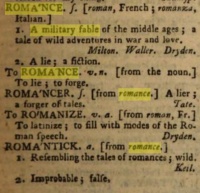Romance
From The Art and Popular Culture Encyclopedia
| Revision as of 14:02, 24 July 2023 Jahsonic (Talk | contribs) ← Previous diff |
Revision as of 06:50, 25 July 2023 Jahsonic (Talk | contribs) Next diff → |
||
| Line 14: | Line 14: | ||
| | style="text-align: left;" | | | style="text-align: left;" | | ||
| "[[Romance]]s are generally composed of the constant loves and invincible courages of heroes, heroins, kings and queens, mortals of the first rank, and so forth; where lofty language, miraculous contingencies and impossible performances, elevate and surprise the reader into a giddy delight. […] [[Novel]]s are of a more familiar nature; come near us, and represent to us intrigues in practice, delight us with accidents and odd events. […] Romances give more of wonder, novels more delight."--''[[Incognita: or, Love and Duty reconcil'd]]'' (1692) by William Congreve | "[[Romance]]s are generally composed of the constant loves and invincible courages of heroes, heroins, kings and queens, mortals of the first rank, and so forth; where lofty language, miraculous contingencies and impossible performances, elevate and surprise the reader into a giddy delight. […] [[Novel]]s are of a more familiar nature; come near us, and represent to us intrigues in practice, delight us with accidents and odd events. […] Romances give more of wonder, novels more delight."--''[[Incognita: or, Love and Duty reconcil'd]]'' (1692) by William Congreve | ||
| - | <hr> | ||
| - | "I mean not however to include all the learned of our country under this observation.—The names of [[Richard Hurd (bishop) |Hurd]], [[James Beattie (poet)|Beattie]], [[Thomas Warton|Warton]], [[Thomas Percy (bishop of Dromore)|Percy]], and [[Paul Henri Mallet|Mallet]], are an honourable exception, a subject that has been thought worthy of any portion of their time and attention, cannot be undeserving the notice and protection of the public. It is with sincere pleasure I add a name that will not disgrace the list, a writer of my own sex, Mrs. [[Dobson]] the elegant writer of the ''[[History of the Troubadours]]'' and ''[[The Memoirs Ancient Chivalry]]''."--''[[The Progress of Romance]]'' (1785) by Clara Reeve | ||
| - | <hr> | ||
| - | "The earliest [[novelist]] whereof antiquity speaks is [[Aristeides of Miletus]], but none of his work remains extant. All we know is that his prose romance was called [[Milesian Tales]]. "--''[[Reflections on the Novel]]'' (1799) by Marquis de Sade | ||
| - | <hr> | ||
| - | "[A ''[[Romance]]'' is a] [[fictitious]] [[narrative]] in prose or verse; the interest of which turns upon [[marvellous]] and [[uncommon]] [[incident]]s; [...] being thus opposed to the kindred term ''[[Novel]]'', [which is] “a fictitious narrative, differing from the ''Romance'', because the events are accommodated to the ordinary train of human events, and the [[modern society|modern state of society]].”--"[[Essays on Chivalry, Romance, and the Drama|Essay on Romance]]" (c. 1815) by Walter Scott | ||
| - | <hr> | ||
| - | "Time and again, in the [[World history (field) |world's history]], [[where East meets West]], the spirit of [[romance]] has been born. [[Herodotus]] on his travels, [[Heliodorus]] carrying Ethiopian traditions to his bishopric, [[Apuleius]] the Carthaginian sojourning at Rome, are all parents of prose romance; and in mediaeval legend, [[Alexander]] in correspondence with the [[Brahmins]], [[Charlemagne]] in conflict with the [[Moors]], furnish the same unfailing inspiration."--''[[The English Novel (1894, Walter Raleigh)|The English Novel]]'' (1894) by Walter Raleigh | ||
| - | |} | ||
| [[Image:Ill-Matched Lovers (Quentin Matsys).jpg |thumb|right|200px|''[[Ill-Matched Lovers (Quentin Matsys)|Ill-Matched Lovers]]'' (c. 1520/1525) by Quentin Matsys]] | [[Image:Ill-Matched Lovers (Quentin Matsys).jpg |thumb|right|200px|''[[Ill-Matched Lovers (Quentin Matsys)|Ill-Matched Lovers]]'' (c. 1520/1525) by Quentin Matsys]] | ||
Revision as of 06:50, 25 July 2023

|
"Romances are generally composed of the constant loves and invincible courages of heroes, heroins, kings and queens, mortals of the first rank, and so forth; where lofty language, miraculous contingencies and impossible performances, elevate and surprise the reader into a giddy delight. […] Novels are of a more familiar nature; come near us, and represent to us intrigues in practice, delight us with accidents and odd events. […] Romances give more of wonder, novels more delight."--Incognita: or, Love and Duty reconcil'd (1692) by William Congreve .jpg) Ill-Matched Lovers (c. 1520/1525) by Quentin Matsys
Romance or romantic usually refers to a love affair which emphasizes emotion over libido. During a long time in English history, the term romance was used to refer to what we now call novels. The term romance stems from vulgar Latin rōmānicē, "in the Roman language", i.e., "Latin"). Ultimately it stems from Rome. See also
See also
Unless indicated otherwise, the text in this article is either based on Wikipedia article "Romance" or another language Wikipedia page thereof used under the terms of the GNU Free Documentation License; or on research by Jahsonic and friends. See Art and Popular Culture's copyright notice.
|

